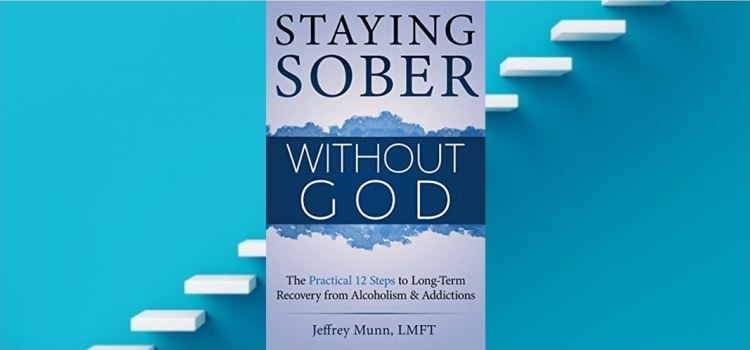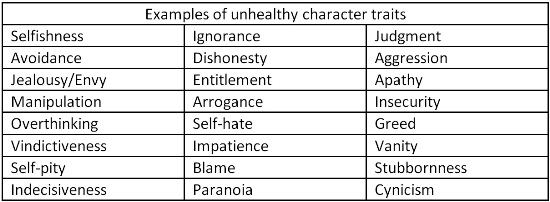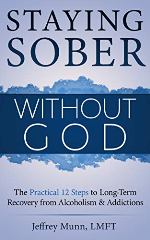Staying Sober Without God – Practical Step Six

AA Version: Were entirely ready to have God remove all these defects of character.
Practical Version: Made a list of our unhealthy character traits.
If you’re the kind of person to pick up a book like this, you’re also probably the kind of person to bristle when reading the original version of this step. It’s not at all far-fetched to conclude that this step is telling us we have certain aspects of ourselves that our defective and can only be remedied by asking a supernatural being to take them away. As a psychotherapist, I obviously disagree with this sentiment. I would be lying and doing a disservice to my clients if I told them, “Well, you have a slew of character defects that neither of us can do anything about. You should probably ask the creator of the universe to take them away.”
The practical version of this step takes a very different approach. We currently possess character traits that have entered unhealthy territory. Referring to them as “unhealthy” implies that we can make them healthy again. The term “defective” is far more pessimistic and suggests there is some fundamental flaw that we possess. We are not defective; we have developed thought and behavior patterns that once served a purpose, but have become dysfunctional. Most of these so-called character defects are actually character assets that have been taken to an extreme in response to life events. For example, if we’re selfish, it could very well be that we didn’t get our needs met in childhood and therefore had to hyper-focus on ourselves (a common precursor to narcissism). It was a coping strategy at the time, but now our circumstances have changed and this tendency causes more harm than good.
As is most of the work in these steps, this part of the process is simple but not easy. We are trying to shape our character traits over a period of time. Shaping is a process that requires consistency and discipline. Sometimes the changes will occur fairly quickly, but more often than not, they will occur at a slower pace than we would like. The more work you put into shaping these new character traits, the faster they are likely to develop. At first, we will be looking to change the most destructive character traits that we possess. As we progress, our effort will be geared more towards fine-tuning aspects of our self that keep us from being our healthiest, which, you guessed it, is a lifelong process.
Your fourth step will come in handy here. It will allow you to get a bird’s-eye view of your behavior and try to identify commonalities between all of your resentments, fears, and harms. I’ll provide some samples in the section about working this step to help you get started. However, the end goal here is not just to end up with a list of our unhealthy character traits, but to end up with a list of healthy character traits that we want to practice cultivating by practicing healthy behaviors. For example, if you tend to be selfish, the way you become less of a selfish person is to do more for others. At first the new behaviors will feel forced an unnatural, but they will eventually become habits, and will therefore result in the development of new character traits.
Working Step Six
People often worked the original version of this step by simply uttering a prayer stating that they were “entirely ready” to have these character traits removed. While I do think it will be helpful to be motivated, the idea of needing to be entirely ready in order to begin a process of change is a misleading one. All you need is to be ready enough to take the first action. So, if you’re ready enough, take a look at your fourth step and make sure you have a sheet of paper (or word processor) available to make a list of your unhealthy character traits.
Start by looking at the “my part” column of your resentment list. What do you see there? What character traits pop out at you as you read down the column? Remember that we previously read this list one row at a time for step five, so reading just the fourth column from top to bottom should be a new experience for you. It will give you an opportunity to more easily see recurring patterns in your behavior. As you read each entry of the fourth column, write one or two words next to it briefly describing the unhealthy character trait (or traits) involved. For example, if your fourth column states something like, “I took advantage of his trust” you may write something like, “manipulation” or “dishonesty” next to it.
Next, look at your fears list. More specifically, look at your negative core beliefs. For example, if you have a negative core belief that you don’t deserve to be happy, what unhealthy character traits might be fueling that belief? Is it insecurity? Self-hate? Self-judgement? All of the above? Whatever they are, write them down next to the appropriate row on your fears list. There will probably be quite a bit of repetition. That’s actually a good thing. It’s what enables us to identify the patterns we’re looking for.
Finally, look at your harms list. Look at each harm and consider what negative character trait enabled you to cause that harm. If you stole from someone, what negative character traits do you think allowed you to do that? Perhaps you were entitled and felt you deserved their possession more than they did. Perhaps you judged them for having more than you. Perhaps you wanted more than you already had, and were therefore operating out of greed. Maybe you were impatient and wanted to get something the easy way instead of earning it. Many unhealthy character traits can apply to one behavior, so jot down as many as you can that you believe apply to you.
When you’ve completed your list, look for any character defects that can be put under the same umbrella. For example, if you listed “don’t do much for others” and “only think about myself” as two separate character traits, you can probably put both of them under the umbrella of selfishness. We want to keep this list as concise as possible because it’s going to determine what we do in step seven. If we have too many highly specific unhealthy character traits, it’s going to be more complicated later on when we try to come up with behaviors to counter each unhealthy character trait.
I’ve created a fairly comprehensive list of unhealthy character traits below. However, I don’t suggest using this list as your only source. Take the time and effort to think for yourself and put your unhealthy character traits into your own words. Go ahead and use this list to guide you, but if you can think of ones that aren’t on this list, please add them yourself. You’ll see that these are mostly single-word descriptions. This is because we want to look at core character traits. If your explanation of an unhealthy character trait is long and complicated, it’s probably a small part of a larger pattern.

Don’t worry about having a perfect list. You’ll probably add on to it later. Also, keep in mind throughout this process that any of these 12 steps can be revisited at any time. In fact, the maintenance portion of the program (steps 10, 11, and 12) is essentially a regular revisiting of all previous steps in some form or another. Let go of the desire to do everything perfectly the first time around.
As soon as you feel confident that you have a decently thorough list of your unhealthy character traits, you’ll be ready to move on to step seven.
For an excellent review of the book, click here: Staying Sober Without God.
Jeffrey Munn was born in Southern California where he still resides with his wife and daughter. He is a licensed marriage and family therapist and has been working in the field of mental health since 2010.
Jeffrey works as a therapist in private practice and specializes in addiction, OCD, and anxiety disorders. In addition to his master’s degree in clinical psychology, Jeffrey earned a degree specialty in co-occurring disorders.
Click here to access the book on Amazon: Staying Sober Without God.
To visit Jeffrey’s website, click here: Practically Sane.


























I bought 3 copies of Jeffrey’s book for use in my group. They have been unused so far, but thank you for publishing this article because I’m pretty sure it will make an excellent discussion topic for this morning’s meeting, even if it’s just for my self evaluation.
Actually each chapter when read here has been illuminating to me. So why I’ve not read his whole book surprises me. Perhaps one becomes so used to wonderful contributions on AA Agnostica and AA Beyond Belief each week that they are more used to opening up to new ideas here.
Or, more likely, we have so much to discuss in our one weekly meeting that we don’t focus on a single one.
Whatever the case, I find getting up early every Sunday morning stimulating and worthwhile. Thank you so much for your persistence in publishing supplemental information and ideas beyond the big book’s prescriptions. Wow, 6 years since Santa Monica and still going strong. Amazing. And life changing for me.
Beneath the religious language, I see psychological value in the 12 Steps. For me, I needed to change the wording to something more practical.
Step Six is about readiness . Here’s where I examine my attachments to character flaws or whatever I choose to call them. There’s an upside to clinging to shortcomings and various aberrant behaviours. Of course, they are problematic as well, but it’s not a one way street.
Letting go is harder than it sounds, most times.
I have been using “Were entirely ready to have Love reduce my character defenses”. I have shared this at regular AA meetings for a couple of years with no problems.
At one time I put a lot of intellectual energy evaluating the causes and conditions around my alcoholism, until a wiser man suggested turning that investigative vitality into doing what was working for others. “The devil be Damned” were his encouragements; so since accepting that advice Serenity has creeped into my days.
I was like the last man on the tilted Titanic, holding on to the rail while the folks in the lifeboats yelled for me to let go and get in the boat with them. But I yelled back, “I’m not getting off this boat until I find out why this happened.”
“God is the best drug there is, and there’s an unlimited supply.” — Cameron F.
Pretty cool line. Even as an atheist, I can acknowledge the benefit of developing new enthusiasms. Trying to be “sober damnit” one day at a time isn’t very attractive.
Hey Roger,
I wanna thank you and this forum for being here. I had my troubles in the small town I used to live in, and was content to have this as my outlet.
I recently went online on Facebook, and found an AA group. I was just browsing, checking it out and I was horrified then disgusted by a post from a young lady, a newcomer, in a great deal of stress at an incident that occurred at a meeting. She was confronted by an older member who was basically bullying her to accept GOD as the answer to her sobriety and without Him she was doomed. Having been a newcomer and having seen firsthand how intimidating something like that can be, and how detrimental it can be to sobriety. That was the horrifying part.
Now the disgusting part, I went on and posted a response with a disclaimer that if your gonna behave by spouting about how AA is the only way and is perfect then don’t bother responding. Now I won’t go into rewriting it, but the gist of it was a little history of the OXFORD GROUP and Sam Shoemaker, and how they played a major part in the writings of AA. I went on to the discuss how holding on to old behavior by refusing to change with the fact that today not everyone is as GOD fearing as when the Big Book and Steps were written.
The responses I received blew me away. Among the responses I received was that AA is perfect, been perfect since the beginning and without GOD it won’t work. I was said to have a resentment, that I’m making all of it up, that I am delusional… If a newcomer can’t accept AA the way it is then the newcomer should go away. This all freaked me out.
I am just so thankful and grateful you guys are all here. THANK YOU.